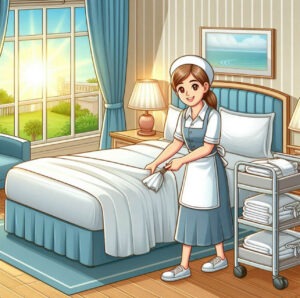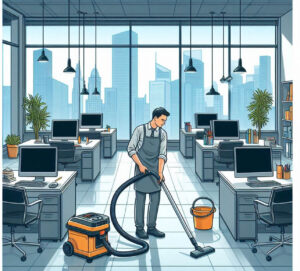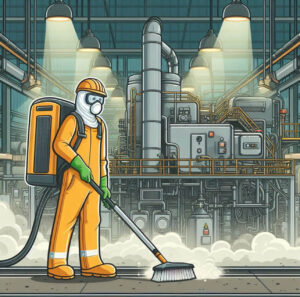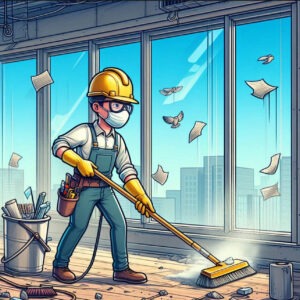Welcome Blessings!
(Tap 🔽 to see more topics!)


Ever notice how there are always places that need tidying up? Well, that constant need usually means there are opportunities for cleaner jobs in all sorts of places, you can imagine! From the office you might visit to the hospital that cares for people, someone’s making sure it’s spick-and-span. And what’s cool is that you often don’t need fancy qualifications to get started in these roles – just a good attitude and a willingness to work.
That’s why we wanted to put together this easy-to-follow guide for you. We will look at seven different types of cleaner jobs that are always hiring. We’ll also give you a heads-up on what questions you might get asked in an interview and some ideas on how to answer them. Whether you’re helping someone you know get ready for an interview or thinking about giving this work a go, you’re in the right place!
Why It’s Always Hiring: Hotels run on tight schedules and spotless impressions. With guests constantly coming and going, there’s always a need for reliable room attendants. Turnover is high, especially in tourist seasons, so hotels are always looking to hire.
What You’ll Do: Clean guest rooms, change linens, restock toiletries, and ensure everything looks perfect for the next guest.
Common Interview Questions & Suggested Answers:
Q: Why do you want to work as a hotel cleaner?
I take pride in making spaces clean and welcoming. I know how much a clean room means to a guest’s experience, and I enjoy being part of that.
Q: How do you handle repetitive tasks every day?
I find it calming. I set small daily goals to stay motivated and always aim to improve my speed and attention to detail.
Q: How would you deal with a guest still in their room when you go to clean?
I’d politely greet them, apologize for the inconvenience, and offer to return later at their convenience.
Why It’s Always Hiring: Cleanliness in hospitals isn’t just about comfort and survival. With strict health codes and infection control policies, these facilities can never afford to be short-staffed.
What You’ll Do: Disinfect surfaces, clean patient rooms, handle biohazard disposal and sanitize high-touch areas.
Common Interview Questions & Suggested Answers:
Q: Do you have any experience cleaning in a medical setting?
Not directly, but I understand the importance of hygiene and following safety procedures. I’m a fast learner and very detail-oriented.
Q: How do you handle cleaning around patients and medical staff?
I stay respectful, quiet, and aware of what’s happening around me. I always ask staff before entering rooms and prioritize safety.
Q: What would you do if you found a needle or medical waste out of place?
I would follow protocol, report it immediately, and never touch anything without proper gloves and disposal tools.
Why It’s Always Hiring: Corporate buildings, shared workspaces, and office parks all need regular cleaning, and they usually want it done after hours. This makes it a good fit for people needing flexible schedules.
What You’ll Do: Empty bins, vacuum floors, dust surfaces, clean bathrooms and kitchens, and restock supplies.

Common Interview Questions & Suggested Answers:
Q: What do you think is most important when cleaning offices?
Keeping it consistent and quiet. Employees should return to a clean space without disruptions.
Q: Can you work evenings or early mornings?
Absolutely. I understand that most office cleaning happens outside regular hours, which works well for me.
Q: How do you manage time when cleaning large areas?
I use a checklist and follow a routine, starting with the high-traffic areas. It helps me stay organized and efficient.
Why It’s Always Hiring: Schools and daycares require daily cleaning to keep students safe and healthy. Flu season? That’s when your role becomes critical. Kids aren’t known for cleanliness, so the demand here is steady.
What You’ll Do: Clean classrooms, hallways, restrooms, and cafeterias. Sanitize toys, desks, and door handles.
Common Interview Questions & Suggested Answers:
Q: How would you clean a room full of toys and child equipment?
I’d use child-safe disinfectants and focus on high-touch surfaces. I’d also ensure everything is dried and safe before the kids return.
Q: Are you comfortable working around children?
Yes, I enjoy the energy of a school setting and know how to be respectful and professional around kids.
Q: How do you prioritize areas to clean?
I start with classrooms and eating areas, then move to the restrooms and shared spaces based on the school’s schedule.
Why It’s Always Hiring: Factories and warehouses have specific cleaning needs: grease, dust, debris, and sometimes hazardous waste. These roles can be physically demanding, so many avoid them, leaving openings more frequently.
What You’ll Do: Clean machinery, sweep warehouse floors, manage chemical spills (with training), and dispose of industrial waste.

Common Interview Questions & Suggested Answers:
Q: Are you comfortable with physical work and heavy-duty cleaning?
Yes. I like staying active and have no problem with tough cleaning jobs. I understand safety is a priority.
Q: Have you used industrial cleaning equipment before?
Not yet, but I’m eager to learn and have experience using tools in other jobs.
Q: How do you handle strong odors or messy workspaces?
I come prepared with the right gear and mindset. The goal is to get the job done right, no matter what.
Why It’s Always Hiring: Busy families, elderly clients, or even Airbnb hosts often hire private cleaners. There’s constant demand with platforms like TaskRabbit, Handy, and local agencies.
You’ll Do General house cleaning: dusting, vacuuming, mopping, organizing, laundry, and sometimes deep-cleaning bathrooms or kitchens.
Common Interview Questions & Suggested Answers:
Q: What makes a great residential cleaner?
Trust and consistency. Clients let you into their homes, so being reliable, respectful, and thorough is everything.
Q: How do you handle specific client requests?
I listen carefully, confirm the details, and adjust my routine to meet their expectations. Communication is key.
Q: Have you worked with pets or children in the home?
Yes, I’m comfortable around both. I use safe products and avoid disrupting anyone in the house.
Why It’s Always Hiring: Every time a building project wraps up, someone has to clean up the mess before it can be used or sold. That someone? You.
What You’ll Do: Remove construction dust, clean paint or grout residue, polish windows, and get everything looking move-in ready.

Common Interview Questions & Suggested Answers:
Q: Have you ever done post-construction cleaning?
Not yet, but I understand it involves deep cleaning and attention to detail. I’m very thorough and love transforming spaces.
Q: Are you familiar with safety procedures on construction sites?
Yes, I know to wear proper gear, watch for hazards, and follow any site supervisor’s instructions.
Q: How do you deal with heavy dust or difficult-to-remove debris?
I use proper tools like HEPA vacuums and scrubbers and don’t rush. Quality matters more than speed in post-construction work.
Answer: Not usually. Most cleaning jobs are entry-level and provide on-the-job training. Employers value reliability, punctuality, and attention to detail more than experience. If you’ve cleaned at home or helped in any informal way, that counts, too.
Answer:
Soft skills like communication and politeness can go a long way, especially in residential and hospitality roles.
Answer: Common ones include:
Interviewers are looking to assess your work ethic, honesty, and how well you follow procedures.
Answer: Dress neatly and simply. Clean, casual clothes (like a collared shirt and jeans or slacks) are usually appropriate. Avoid strong perfumes or colognes, and wear closed-toe shoes. Looking tidy shows, you take hygiene seriously, which is a big plus.
Answer: It depends on the country, type of job, and employer. On average:
In the US, pay typically ranges from $13 to $20/hour. It might vary from £9 to £14/hour in the UK.
Answer: Absolutely. Many cleaners move into roles like:
Cleaning is one of those industries where hard work is directly noticed and rewarded.
Answer: Depends on the setting:
Many roles are flexible, which is excellent for people balancing other responsibilities.
Answer: Yes, it can be physically demanding. You’re on your feet, moving around, lifting, scrubbing, and sometimes working in hot or messy environments. However, many people enjoy the activity and are satisfied with seeing instant results. Think of it like a paid workout with visible progress.
Answer:
Trust your gut. If it feels off, it probably is!
Answer: Usually no, but for specialized cleaning (like hospitals, industrial, or hazardous waste), basic certifications in health and safety may be required. Examples include:
The employer can often provide these.
Answer: Depends on the job, but commonly:
Green or eco-friendly options are also becoming more popular in residential and office cleaning.
Answer: In many cases, yes. Basic communication is essential, but many cleaning roles rely more on action than words. However, learning basic phrases and safety terms can significantly help and open more opportunities.
When a place feels clean, it just feels better. Whether it’s a sparkling hotel room or a tidy school classroom, cleanliness doesn’t just happen. Someone makes it happen. And that’s what these cleaner jobs are all about: making a real difference in how people experience their spaces.
Getting started in this kind of work is often more about being willing and ready than having a long list of qualifications. But going into an interview feeling prepared can make you shine. Remember what we’ve talked about here, whether you’re helping someone get ready or getting ready yourself. Showing that you get the importance of the job and that you’re enthusiastic can go a long way.

Voila! Until next time!